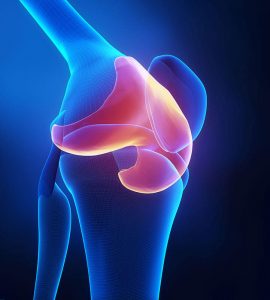What is Knee Cartilage Repair?
Knee cartilage repair is a surgical procedure that repairs worn-out or damaged cartilage in the knee. The cartilage provides a smooth surface for joint movement. When damaged, it can cause pain, inflammation, and limited mobility.

What are the Types of Knee Cartilage Repair?
The type of knee cartilage repair used will depend on factors such as the extent of injury as well as the patient’s overall health, age, and activity level.
Microfracture Surgery: Microfracture surgery is a minimally invasive procedure that stimulates the growth of new cartilage by creating tiny holes (fractures) in the underlying bone, which triggers the body’s natural healing response. Blood and bone marrow, which contains stem cells, flow out of these holes, forming a blood clot that aids in the formation of new cartilage.
Cartilage Grafting/Transfer: This procedure involves transplanting a small piece of healthy cartilage from one area of the knee to the damaged area. Surgeons typically use this procedure for smaller cartilage defects, and it offers the advantage of using the patient’s own tissue. In some cases, a donor graft may be used.
Autologous Chondrocyte Implantation (ACI): In ACI, surgeons arthroscopically harvest chondrocytes (cartilage cells) from a non-weight-bearing part of the patient’s knee. These cells are cultured and multiplied in a laboratory over several weeks before being implanted into the damaged area of the knee.
Restore function and mobility to your knee.
Schedule an appointment with our orthopaedic doctor, Dr James Tan, at 8028 4572 for personalised treatment.
How is a Knee Cartilage Injury Diagnosed?
Diagnosing a knee cartilage injury will involve the doctor taking a detailed medical history and performing a physical examination of the knee. This may involve checking for tenderness, swelling, and range of motion. Additionally, imaging tests such as X-rays and MRI scans can be used to provide an in-depth look into the internal structures of the knee. If the diagnosis remains uncertain, the doctor may recommend a diagnostic arthroscopy. This minimally invasive procedure involves inserting a small camera into the knee joint to inspect for damage.
Who is a Good Candidate?
Suitable candidates for knee cartilage repair typically have significant pain, swelling, or stiffness in their knee that limits their daily activities and are not responding to non-surgical treatments such as physiotherapy, pain medications, or corticosteroid injections. Other factors include:
- Patients with localised cartilage damage
- Active individuals who wish to continue a physically demanding lifestyle
- Younger patients with isolated injuries – while age is not an exclusive factor, younger patients tend to recover more effectively
Let us provide you with a tailored and evidence-based treatment for lasting relief to your knee.
What is Recovery Like after Knee Cartilage Repair?
Generally, patients can expect to use crutches or a knee brace for several weeks after surgery to limit weight-bearing on the recovering knee. Physiotherapy will play a crucial role in recovery, helping to restore strength and mobility to the knee.
Pain and swelling are common after surgery, but these should gradually improve over time. Following the surgeon’s post-operative instructions and attending all follow-up appointments is essential to ensure the best possible outcome.
In most cases, full recovery and return to high-impact activities can take several months to a year.
Recover with confidence knowing as we see you through rehabilitation and full recovery.
FAQs
How long does a knee cartilage repair take?
The duration can vary depending on the specific type of procedure being performed and the extent of the cartilage damage. On average, it can take anywhere between one to three hours. Less invasive procedures, like arthroscopic surgeries, might be shorter, whereas more complex repairs or reconstructions would require more time.
How long before one can return to sports after a knee cartilage repair?
Generally speaking, patients may need to wait several months before engaging in athletic activities. Patients can often resume low-impact sports sooner, around 3-6 months post-operation, while high-impact sports or activities that place significant stress on the knee might require a longer recovery period, potentially 6-12 months. Patients must follow their surgeon’s advice in order to ensure optimal healing.
What are the potential risks of knee cartilage repair?
As with any surgical procedure, knee cartilage repair comes with possible risks. These can include infection, bleeding, blood clots, and damage to surrounding structures; or the risk that the repaired cartilage does not heal properly, or that the patient continues to experience pain after the procedure. Nonetheless, knee cartilage repair is generally considered a very safe procedure, especially in the hands of an experienced and accredited orthopaedic surgeon.




